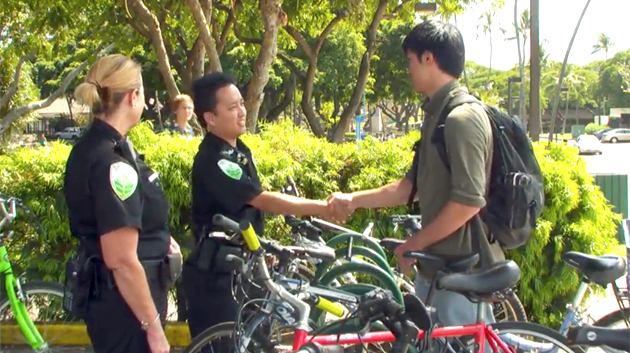
The University of Hawaiʻi at Mānoa Department of Public Safety (DPS) recently achieved re-accreditation through the Commission on the Accreditation for Law Enforcement Agencies, Inc. (CALEA®) in July 2023. In 2019, DPS was the first college campus security agency to receive CALEA accreditation in the state, and just the second in the nation. Currently, DPS is also one of six nationwide agencies to receive the CALEA Campus Security Advanced Accreditation.
“Maintaining our CALEA accreditation is a testimonial to the professionalism that our officers and employees demonstrate at UH Mānoa on a daily basis,” said DPS Chief Andrew Black. “I am very proud of the women and men of DPS and their dedication to making the University of Hawaiʻi at Mānoa a safe place to learn, work and visit.”
In order to achieve accredited status, DPS must comply with 293 standards and maintain continued compliance in order to keep their status. Accreditation lasts four years, during which time the agency must submit annual reports and participate in annual web-based assessments attesting continued compliance with those standards under which it was initially accredited. At the end of the cycle, peer assessors conduct a site-based review which includes interviewing various students, faculty, staff and community members. Once the review is completed, DPS sends representatives to attend a public hearing before the commission and is awarded re-accreditation.
Community involvement
The CALEA accreditation process is an ongoing effort, and initially involved more than three years of policy development and training, to align the department with industry best practices. Over the past four years, DPS has focused on strengthening department operations and policies even more, in order to receive the Advanced Accreditation status. The program focuses on the safety and security of students and employees, and applies standards that require organizations to consider critical issues such as facility risks, regulatory reporting, technology-based security monitoring, preventative patrol and a host of other issues that provide comprehensive service delivery. These concepts center on the community-oriented policing model, which seeks to involve the community in crime prevention and education.
Community-oriented policing provides a framework in which public safety agencies and citizens can work in partnership to prevent and control challenges confronting our communities and provides clear direction about community expectations. Accreditation serves to give an agency a proven management system of written directives, sound training, clearly defined lines of authority, and routine reports that support decision-making and resource allocation.
“We appreciate the UH Mānoa community’s continued support in our efforts to ensure a safe and secure campus for our students, employees, and visitors,” Black said.

